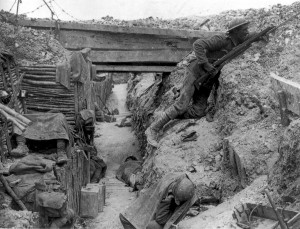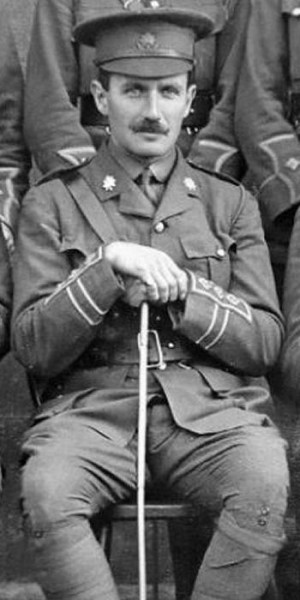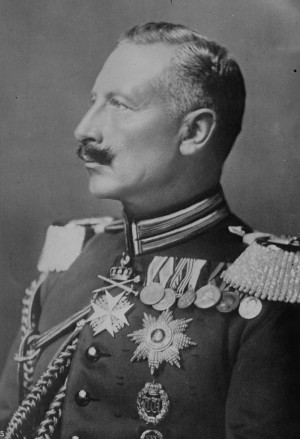When is the last time you gave your word and didn’t keep it? I know, your intentions were good, but something came up, etc.
My father had his principle:
When you say something, make it happen.
And so he did. It stuck in my mind and I’ve been trying to apply it ever since. There are many times when others expected me to make a promise, which I never did or promised less than expected – because that much I was sure to be able to keep. Usually, this approach of mine was not understood. Even though I did more than I had promised. But I continue to believe in my principle.
I’m fascinated by every story about people who keep their word. Just like the one I’m about to tell you. It’s an astonishing lesson to remember every time you make a promise.
On this page:
The Great War
In order to better comprehend this story, I’ll make a short digression in reference to The Great War, which we call The First World War.
On the 28th of June 1914, a tragic event was about to change the history of the entire human kind. Not a flutter of a butterfly’s wing, but a bullet shot by a gun. Franz Ferdinand, the archduke of Austria and the heir to the throne of the Austro-Hungarian Empire was assassinated at Sarajevo by a Bosnian nationalist.

That’s how it all began. Austria-Hungary rushed to put the blame on Serbia (which had unionist ambitions with Bosnia) and declared war. Russia hit the ceiling: Hey, don’t pick on my little brother! Germany remembered that it is related to Austria-Hungary and showed its muscles – how could they miss such a fight? After they did their warm up with Luxembourg and Belgium, the Germans hit on France, who, back then, was on friendly relations with Russia. Meanwhile, Great Britain got upset because Germany had set foot in Belgium and started to make noise from across the streamlet. The Ottoman Empire made a secret alliance with Germany, because it had previously been beaten by the Russian Empire. In Asia, India – which was still a British colony – showed its powerful support for the Big Boss. Japan, New Zealand and Australia thought it was a good time to pick at some islands that the Germans had already colonized. In Africa, they pursued the same colonial interests. And gradually, almost every country engaged in the fight.
Meanwhile, the United States tried to break them up by diplomatic means. (Why me, they were the pacifists back then!) Only, the Germans had the itches: they fuelled the Mexican territorial conflicts in the Southern part of the United States and sank American ships. Thus, on the 6th of April 1917, the United States put its foot down: Enough with this bullshit! One year and a half later, Germany and all its allies were out for the count.
This whole absurd scenario would have been fit for mocking in a Charlie Chaplin movie. Unless the madness turned into an unbelievable tragedy. 9.5 million soldiers found their death. 7 millions were mutilated out of the 21.2 millions who were badly injured 1)”A Short History of the First World Warby Gary Sheffield, book published by Oneworld Publications in 2014.
In addition, it is estimated that 2 million civilians died due to food shortage. The weak immune system of the population and the consequence of a precarious lifestyle, led to outbreaks of typhoid fever and malaria, which made millions of victims. Between 1918 and 1920, a flu pandemic (known as the Spanish flu) cut short the lives of 50-100 million people.
And all these dead people, along with the injured or ill, had relatives and friends who suffered for them. The pain was tremendous.
No matter how hard your life may seem to you, just be thankful for not having to live during those times.
Prisoner of war

Robert Campbell joined the British army in 1903, just after he got out of adolescence.
The Great War took the young Captain Robert Campbell to France. He was 29 years old.
In July 1914, soon after the outbreak of the war, the regiment he had under his command occupied a position next to the Mons-Condé canal, in the North-West of France.
A week later, they were attacked by the Germans. Not many could make a stand against the powerful German army, so they lost the fight.
Captain Robert Campbell was injured and taken prisoner. He was lucky that the war had only just begun, when it was still fair play, so the Germans thought fit to send him to a hospital in Cologne, where he had his wounds treated.
After that, he was sent to a prisoner-of-war camp in Magdeburg 2)”Meeting the Enemy: The Human Face of the Great War” by Richard van Emden, book published by Bloomsbury in 20133)”First World War Folk Tales” by Taffy Thomas and Helen Watts, book published by The History Press in 2014.
News from home
In 1916, Captain Robert Campbell was still in the prisoner-of-war camp.
The days were passing in a monotonous way. Until he got bad news from home: Louise, his mother, was dying. She had cancer.
If you were him, what solution would you have found, as a loving son, to see your mother for the last time?!
You surely think about escaping, heroic deeds, mission impossible…

Instead, Captain Robert Campbell made an astonishing choice: he wrote a letter to the Kaiser Wilhelm II, in which he explained the situation and respectfully solicited a… furlough. Yes, he asked for a leave of absence from the camp, so that he could see his dying mother in Gravesend, a town in South-East England.
Despite being such a belligerent man, the Kaiser must have been impressed by such a simple and human request. In his imperial generosity, he granted him a 2-week furlough, plus four extra days for the round trip. With one condition: to get back, on his word of honor 4)”First World War Folk Tales” by Taffy Thomas and Helen Watts, book published by The History Press in 2014.
You can imagine what was in poor Captain Robert Campbell’s heart. He was leaving a prisoner-of-war camp like no other enemy soldier had ever done before: in broad daylight, through the gate, while the guardians were watching him.
The return to England
On the 7th of November 1916, Captain Robert Campbell was arriving in the town of Gravesend 5)”Meeting the Enemy: The Human Face of the Great War” by Richard van Emden, book published by Bloomsbury in 2013.
Of course, he had mixed feelings about his return to England. He was glad to set foot once again on his beloved homeland and to see his relatives and friends. But he was also terribly afflicted by his mother’s condition.
Let’s say you are a young man in full bloom. Christmas is a month away. These are your last months to spend with your mother. The world is engaged in a war of life and death, a war like none other. Are you willing to return into your enemy’s prisoner-of-war camp?
That’s exactly what Captain Robert Campbell did. Nothing could stop him from keeping his word.
Back to the camp
You may be thinking that Robert Campbell was some kind of a wimp. That he was just blindly following orders. But it’s not like that.
Once he got back to the camp, Captain Robert Campbell had just one thought in mind: to escape! (Like he was playing some Room Escape games.)
Along with a group of prisoners, he participated in the digging of a secret tunnel, just like in the movies. They had been digging for 9 months with tools from whatever they could find around them. And they finally did it! They dug a tunnel long enough to assure their way out of the prisoner-of-war camp.
They were off to Holland, taking the same road as Captain Robert Campbell did on his journey back home. Only they know how they had managed to walk more than 300 km across Germany. When they were just about to leave the country, they were captured 6)”Meeting the Enemy: The Human Face of the Great War” by Richard van Emden, book published by Bloomsbury in 20137)”First World War Folk Tales” by Taffy Thomas and Helen Watts, book published by The History Press in 2014.
Brought back to the camp, they didn’t do better. But at least they had done their duty as soldiers who had been taken prisoner.
The war ended a year later. Captain Robert Campbell would once again go out through the gate of the camp, but this time for good.
The thick end of the stick
One of the reasons for which Captain Robert Campbell came back from Great Britain to the German camp was because he hoped that, by his own example, he would open a door for other prisoners who were in the same situation as his. He cared about others more than he cared about himself.
Peter Gastreich, a German prisoner on the Isle of Man, had a similar request, this time forwarded to the British. The German side brought in the case of Captain Robert Campbell to support their argument. Only, the British authorities gave an awfully bureaucratic response, saying that they hadn’t been asked if they agreed with such arrangements 8)”Meeting the Enemy: The Human Face of the Great War” by Richard van Emden, book published by Bloomsbury in 2013. Therefore, neither the Germans granted leave of absence to other British soldiers. That’s how it was brought to an end what could have become a custom full of humanity during the tragic times of war.
Captain Robert Campbell survived the Second World War. He died in July 1966, at 81 years old.
I don’t know if Robert Campbell was a brilliant soldier. Maybe not.
But given his example of what it takes to keep one’s word, he truly deserves our admiration and more. I would raise a monument in his honor.
We live in a society where “I promise!” has become the equal of “I’ll do my best!” or “I would like that too!”
Still, they are not the same. You can feel the difference when promising to a little child and not keeping your word. Even at 5 years old, he knows how heavy the responsibility of a promise should be. Look for the sufferance in his eyes and then you’ll think twice before uttering the magic words: “I promise!” And not only to him.
Keeping your word is, first of all, a matter of respect towards yourself. Captain Robert Campbell didn’t return to Germany so that the Kaiser would not get upset at him. Having so many problems on his mind, the Kaiser would at most curse that scoundrel of an Englishman (that’s if he would have found out in the first place). But Robert Campbell would have carried this burden for the rest of his life. Maybe even beyond that.
Any broken promise is a waste left somewhere. Even if it’s a small waste, it’s not an insignificant one. They keep piling up.
Try to promise less and do more. Even if others don’t understand it. They will some day.
And if you promise, your word should be your moral law. Like it was for the wonderful man that was Robert Campbell.
Amazing story of the man who did what governments and humanitarian organizations weren't able to do
The transcript of the speech Mother Teresa delivered on the day following her Nobel Prize for Peace awarding, with many interesting annotations
References
| ↑1 | ”A Short History of the First World Warby Gary Sheffield, book published by Oneworld Publications in 2014 |
|---|---|
| ↑2, ↑5, ↑6, ↑8 | ”Meeting the Enemy: The Human Face of the Great War” by Richard van Emden, book published by Bloomsbury in 2013 |
| ↑3, ↑4, ↑7 | ”First World War Folk Tales” by Taffy Thomas and Helen Watts, book published by The History Press in 2014 |
Did you like it? Now it’s your turn. You’ll make us very happy if you share this article with your friends:
And don’t forget to let us know what you think – we are really interested in your thoughts on this!




